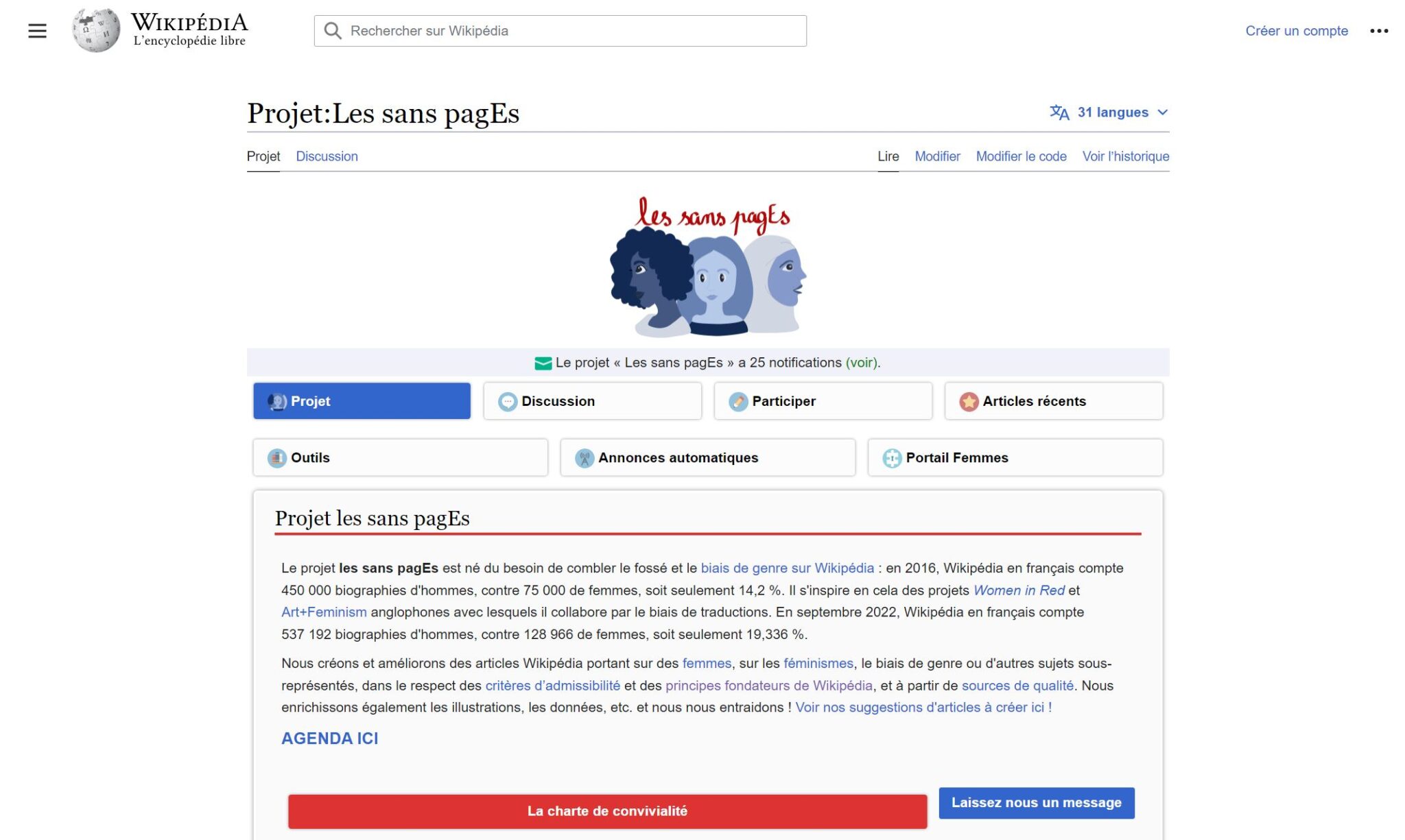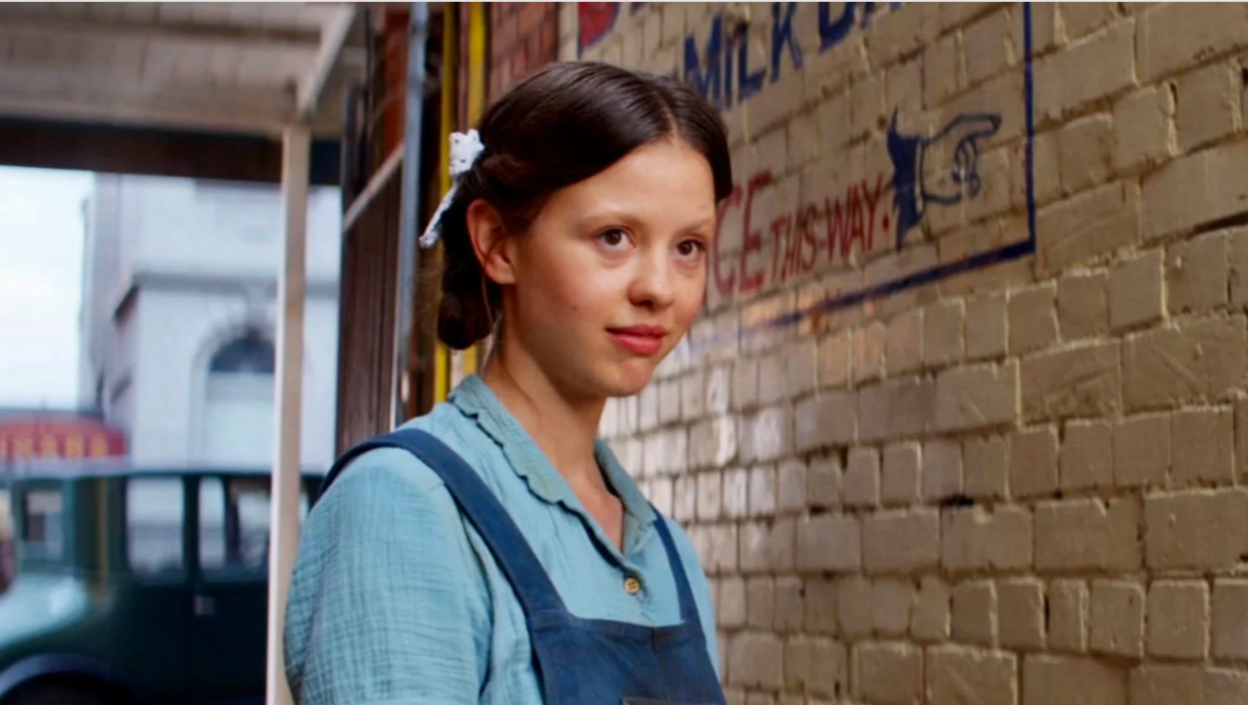It is the sixth most consulted site in France: Wikipedia’s popularity has long been proven. Free, reliable and sourced, the collaborative encyclopedia is an open and massively used well of knowledge.
But at a time when forgotten female figures in history fill the heads of gondolas, the mechanisms of women’s invisibility within the sources of knowledge are also perpetuated on Wikipedia: among the millions of articles it offers, the gender gap is wide. . So much so that in 2016 the French-speaking sphere of the platform counts 450,000 biographies of men … against 75,000 of women.
It’s to make room for women on Wikipedia – and therefore, in common knowledge -, that the sans pagEs project was born. Its goal? “Create or improve Wikipedia articles on women, feminisms, gender bias or other underrepresented topics, within the eligibility criteria and founding principles of Wikipedia and the quality of the sources.”
Since few of us understand how Wikipedia works and the collective production of an encyclopedia, Natacha Rault and Anne-Laure, members of sans pagEs, deciphered sexist prejudices with Madmoizelle that persist on the platform and how they are committed to fighting this reality.
Wikipedia, Wikimedia and the encyclopedia ecosystem
Natacha Rault is director of the des sans pagEs association and founder of the project of the same name. Two different things, since in the language of Wikipedia the projects allow you to do so “Coordinate community efforts grouping contributors around the themes. ”
In other words, different voluntary contributors (on Wikipedia, paid production is strictly regulated) around the same topics you can find space for design, exchange and debate.

In 2015 Natacha Rault was commissioned by the University of Geneva for a conference on the gender gap on Wikipedia. Frustrated with addressing the issue of women’s invisibility on the platform without intervening, she decides to create workshops to create and improve women’s biographies. She workshops awarded by Wikimedia during an annual meeting, where she meets the founder of women in red.
“The woman in red is an English-speaking movement, whose name means ‘women in red’. On Wikipedia, people whose names are associated with a referenced page appear in blue and since women are much less likely to have articles, their links are mostly red, illustrate the gender gap.
This movement was concerned with reducing the gender gap on English-language Wikipedia, but there was no equivalent among French-speaking people. We thought it was time to create it. “
Accompanied by volunteers, Natacha Rault raises funds from the Wikimedia Foundation, the University of Geneva and Wikimedia Switzerland. In 2017, the association Les sans pagEs is born, to transparently manage the loans received. The project and the association are born.
The gender gap on Wikipedia
In 2022, only 19.336% of biographies in the French-speaking sphere of Wikipedia are about women. The increase is visible, but far from sufficient. For Natacha Rault there is a real problem with the representation of women on Wikipedia. She lights up:
“Most of the contributors on Wikipedia are men. This is already a reality that influences the content. Because, in a patriarchal society, we are not socialized in the same way, men and women tend not to write about the same topics.
This is all the more true since with the mental load, the family load and all the responsibilities that women take on, making a third day on Wikipedia is complicated!
We therefore see fewer so-called female subjects and fewer subjects on women. Added to this is the question of the invisibility of women in history and the stories that are made of it, which has consequences for the knowledge transmitted on Wikipedia. “
It’s not all. Not only are there fewer women, but they are also less represented. Anne-Laure (who asked to be mentioned by name only), Wikipedian since 2012 and now president of the association Les sans pagEs, notes:
“Wikipedia pages for women include much more information about their private life, their emotional and sexual ties. We don’t see so many details in men’s biographies! They will also be called by their name much more often. Some words come up often: wife, mother …
It is also a question of sources. We rely, among other things, on press articles and we see that often, when we talk about pioneers, journalists talk about their clothes, their private life, their character… It is important to have better described models. ”
But if the bias on the platform is obvious, it also reflects pre-existing prejudices in our society. Natacha Rault reminds us:
“Wikipedia is, more or less depending on the year, the 5th most visited site in the world. Every time you do a search, Google’s algorithm makes it appear first: it’s a very popular site, and if it keeps biases, this will have a major impact on future mindsets.
But at the same time, these prejudices also exist externally. Wikipedia shouldn’t be ahead of society, and an encyclopedia doesn’t do a new job. It must go back to sources already produced. You can’t create things ex nihilo on Wikipedia! If there are fewer articles about women in the newspapers, there will be fewer articles about women on the platform. ”
How sans pagE act against the gender gap
Today, in addition to creating and improving the pages of women’s biographies, les sans pagEs are also improving content on feminism and gender identity.
“We have articles on gay and lesbian cultures, on the treatment of homosexuality abroad or on night prides … We don’t just make biographies, we also try to document things in an encyclopedic way, always respecting the sources and criteria of Wikipedia. Much is missing because so far most of the articles have been created by white, heterosexual, economically wealthy men. “
explains Anne-Laure. To do this, there are on the one hand the volunteers who contribute to the Wikipedia dei sans pagEs project, but also the actions of the association. Organize events, training in the creation of Wikipedia pages, page editing marathons … All this, paying the babysitting expenses participants, if necessary, to remain accessible.
Many actions that highlight the invisible work of many women over the centuries. But since Wikipedia is a collaborative platform, where everyone has a voice, this one sometimes it creates heated, even violent debates. Natacha Rault explains:
“Wikipedia is a collaborative project, everyone can contribute and create an account. Each community is different and has its own rules. In the French-speaking community, we respect the five founding principles from Wikipedia, the rest should be adopted with strong consensus.
It is a space where we discuss a lot. There are people from various walks of life, political or religious views, social backgrounds, who disagree. But in theory, there should be no personal attacks and you don’t undo other people’s changes without discussing it.
There is also debates on admissibility: when an article is produced, if someone finds it uninteresting, we can create a debate where everyone can give an opinion. The problem is that for some minorities it can be quite violent: when we are discriminated against, we don’t necessarily have the opportunity to discuss their existence, or our right to be treated as equals.
In the French-speaking Wikipedia, for example, there have been great debates about neo-pronouns. The iel is rejected by the majority, even if it is entered in a dictionary, so we cannot use it. We are forced to write very long paraphrases in order not to misunderstand people, while “they” is commonly accepted in the English language Wikipedia. Each Wikipedian community has its own specificities, its own ways of doing things. ”
To change encyclopedias, you have to change the prejudices of society
To continue contributing to the enrichment of the Wikipedia pages, Natacha Rault and Anne-Laure note that it is above all necessary changes in the way society talks about women and their jobs.
“There are several media biases that we have to address. In the press there are many interviews with women, but very little analytical work, and therefore of synthesis. We cannot therefore use it: they are not secondary sources, but primary sources. They can be used sparingly, but they don’t establish a subject’s eligibility
There are many pioneers that we cannot write about, because they are ignored by the press. I am thinking, for example, of Marion Créhange, one of the first people to take a thesis in computer science in France. Everyone advised us to write about her, but we couldn’t: we didn’t have enough secondary sources to write an article. We were only able to do this after her death.
There are also many translations from American culture because there are insufficient sources to speak from here. On feminist science fiction, the history of women in computer science, female scientists … In France many women are involved in these matters, but we have no sources! We need to make room for them in the press. “
Front page photo credit: Fhala.K – Own work / Wikipedia page without pages
Source: Madmoizelle
Ashley Root is an author and celebrity journalist who writes for The Fashion Vibes. With a keen eye for all things celebrity, Ashley is always up-to-date on the latest gossip and trends in the world of entertainment.


.png)

